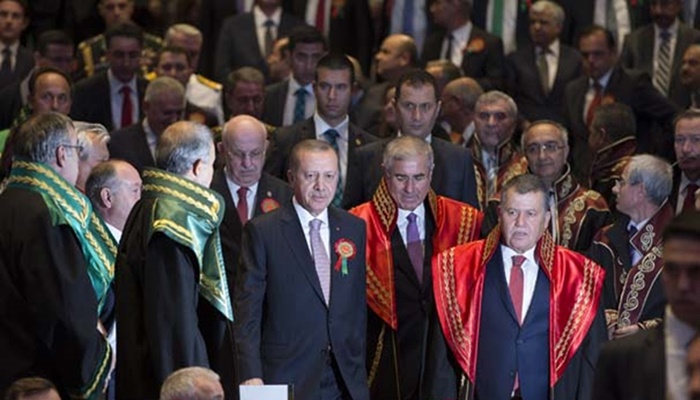The Venice Commission, the Council of Europe’s advisory body on constitutional matters, stated in a recent report that the powers of the president and parliament to appoint almost all members of Turkey’s Council of Judges and Prosecutors (HSK) “gives the executive complete control over the body that is supposed to guarantee the independence of the judiciary.”
The Venice Commission’s opinion, published on Monday following a request from the Monitoring Committee of the Parliamentary Assembly of the Council of Europe (PACE) earlier this year, expressed significant concerns regarding the composition and functioning of Turkey’s HSK, a body responsible for judicial appointments, promotions and disciplinary measures.
The Commission found that the president, as head of the executive, directly appoints six of the 13 members of the HSK. A further three or four members are selected by the Turkish parliament, where the ruling party has considerable influence. This gives the executive overwhelming control over a council that should act as a guarantor of the independence of the judiciary.
In Turkey’s presidential system, the president exercises both executive and head of state powers and is actively involved in party politics.
Lack of peer elections
International standards recommend that at least half of the members of the judicial council should be judges elected by their peers to ensure independence.
In Turkey, however, judges and prosecutors are not elected by their peers, but are either appointed by the president or selected in a parliamentary process dominated by the ruling party.
This, the commission argues, creates a judiciary that is subordinate to political authority and exacerbates judges’ and prosecutors’ fear of reprisals or dismissal.
The commission also criticized the fact that the HSK includes ex-officio members, such as the minister of justice and the undersecretary of the ministry of justice.
These functions, according to the report, allow the executive to influence judicial decisions, disciplinary measures and even investigations against judges and prosecutors. The report expresses concern that the minister’s power to authorize inspections and investigations against judges increases the risk of politically motivated disciplinary measures.
The commission also pointed to the lack of adequate security of tenure and functional immunity for HSK members.
The current legal framework allows vague allegations and undefined standards to lead to warnings or dismissals of council members, threatening their independence. The report emphasized the need for constitutional safeguards to protect council members from undue pressure or politically motivated dismissals.
Systemic flaws
The Turkish judiciary has come under increasing criticism since the country switched from a parliamentary to a presidential system following a constitutional referendum in 2017. The Venice Commission emphasized that judicial independence is a cornerstone of democracy and that urgent reforms are needed to depoliticize the appointment of judges and ensure transparency.
The Commission noted that Turkey is an outlier in Europe, with most countries ensuring peer elections for judicial councils or using mechanisms to protect against political influence. It called for legislative changes to increase the proportion of peer-elected judges and improve diversity in judicial representation.
The Venice Commission called on Turkey to remove the minister of justice and the undersecretary of the ministry from the HSK and to increase the proportion of peer-elected judges and prosecutors to at least half of the council.
The commission also called on Ankara to establish clear and limited grounds for disciplinary action against HSK members to ensure security of tenure and immunity and to expand the size of the council to allow for greater representation of judges, prosecutors and different social groups.
The commission warned that the current system undermines public confidence in the judiciary and fosters a climate of fear among judges and prosecutors, many of whom report being influenced by concerns about strategic dismissals or politically motivated transfers. It stressed that the independence of the judiciary is an essential prerequisite for upholding the rule of law and protecting human rights.
Turkish President Recep Tayyip Erdoğan lambasted the judiciary in 2013 after a graft probe targeting the highest echelons of his government exposed a bribery scandal. He accused the judges and prosecutors as well as police officers involved in the investigation of working for the Gülen movement, a faith-based group critical of his administration.
Until 2016, Erdoğan tried to redesign the judiciary by appointing loyalists to critical posts. The aftermath of a failed coup in July 2016 led to an unprecedented crackdown, mainly on Erdoğan’s opponents.
Turkey disbarred more than 4,000 judges and prosecutors immediately after the aborted coup over alleged ties to the Gülen movement, which it accused of orchestrating the attempted putsch. The movement denies any involvement.
The mass disbarment of members of the judiciary is believed by many to have had a chilling effect on the entire justice system, intimidating the remaining judges and prosecutors into doing the government’s bidding by launching politically motivated investigations and trials of critics.
Turkey was ranked 117th among 142 countries in the rule of law index published by the World Justice Project in October, maintaining its 2023 ranking.



